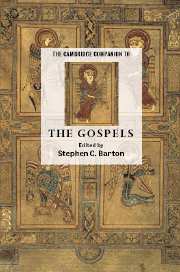Book contents
- Frontmatter
- Introduction
- Part I Approaching the gospels: context and method
- Part II The gospels as witnesses to Christ: content and interpretation
- Part III The afterlife of the gospels: impact on church and society
- 10 The gospels and the development of doctrine
- 11 The gospels embodied: the lives of saints and martyrs
- 12 Praying the gospels: spirituality and worship
- 13 Living the gospels: morality and politics
11 - The gospels embodied: the lives of saints and martyrs
from Part III - The afterlife of the gospels: impact on church and society
Published online by Cambridge University Press: 28 January 2007
- Frontmatter
- Introduction
- Part I Approaching the gospels: context and method
- Part II The gospels as witnesses to Christ: content and interpretation
- Part III The afterlife of the gospels: impact on church and society
- 10 The gospels and the development of doctrine
- 11 The gospels embodied: the lives of saints and martyrs
- 12 Praying the gospels: spirituality and worship
- 13 Living the gospels: morality and politics
Summary
According to a stream of contemporary theology and biblical studies, the church's most basic interpretation of scripture is its embodiment of faith, in word and action. Certainly, literary, historical and other critical tools ought to bear on how the Bible is understood, but, at its fundamental level, the truth of scripture is most fully grasped when lived out. This interpretative 'living out' is akin to 'performance'. It is analogous, for example, to an orchestra performing a symphony. The Bible, in other words, is understood genuinely and deeply when it is conveyed through human life, in the words and deeds of particular people, who venture to live out, in particular times and places, what they have heard, read and experienced of God in Christ. As a matter of consistency, according to the nature of scripture as canon, people of faith expect saints to be named where the Bible is read and the gospel proclaimed. From scripture flows a canon of saints. In so far as interpreting the gospels through human life may be fruitful, the undertaking is necessarily extrabiblical, deeply personal and existential, and unavoidably theological. If living the gospel is a sure way to grasp it, the 'taking hold' is a venture that does not yield incontestable proof or demonstration. On the one hand, a person interprets and applies the gospels to life, and on the other, this person's life is interpreted by others in its conformity to the gospels. Each step along the way is a wager of faith. The meaning of a gospel text is mediated by people who respond to scripture as an existential call. A person's present-day is discovered in the text, as the gospel takes hold of the person; that is, his or her life is interpreted through the filter of the text.
- Type
- Chapter
- Information
- The Cambridge Companion to the Gospels , pp. 224 - 244Publisher: Cambridge University PressPrint publication year: 2006

